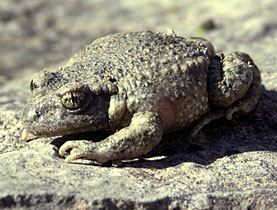Surplus baby hippo could end up as animal food

A newborn hippopotamus named Farasi bounced into Swiss hearts and headlines earlier this month thanks to a series of cute photographs.
But Basel-born Farasi could face a spectacular reversal of fortune: ending up as fodder for other zoo animals. The zoo says this is not uncommon, and it is unusual for the media to pay so much attention to the fate of one animal.
“Hippo to end up as animal food,” ran the headline in one of Switzerland’s free dailies on Monday morning.
A spokeswoman for Basel Zoo, where Farasi came into the world, confirmed that the 50kg baby hippo needed a new home.
“If we don’t find a good place, he might be killed and eaten by other animals in the zoo,” Tanja Dietrich told the French language Le Matin newspaper on Saturday.
In zoo speak, Farasi, who appeared in newspapers around the world, is a “surplus animal”.
The problem, according to zoo officials, is that there isn’t enough space for an entire family. That Farasi is a bull – there can usually only be one in a small group – makes the situation more complicated.
Basel Zoo will try to find a home for Farasi, Dietrich told swissinfo. Of the eight hippos born there over the years, one died and six others found homes.
So even after Farasi is weaned – a process that will take some months – his odds are reasonably good. He could remain for a few years but the zoo says there will eventually be a deadline for when he must go.
“Just a fact”
Peter Schlup from Swiss Animal Protection says virtually all zoos put their excess animals to sleep.
“I wouldn’t call it a problem,” he told swissinfo. “I think everybody who visits zoos should know that a certain number of animals are killed every year. It’s completely normal and it’s a fact if you keep animals.”
Schlup says most zoos do not have enough space to accommodate the offspring of all their animals.
“Basel Zoo always has the problem of not enough space. It would like to be bigger but it’s not that easy because it’s in the middle of the city. There is no possibility to enlarge the area.”
The zoo has space for two grown hippos and one calf, although Dietrich said the institution has had two adults and two calves at one time. She is not sure what to make of the fact that this particular animal has gained so much publicity.
“It’s a very cute animal but when boars, antelopes or other animals are killed in the zoos and fed to the other animals it’s never an issue,” Schlup said in reference to the hippo’s media profile. “Nobody calls us because it’s not a story.”
Hippo hyperbole
“Little Farasi is going to die,” bemoaned 20 Minuten, Switzerland’s highest circulation free daily, on Monday.
“Help! Who will rescue me?” asked Sunday’s Blick tabloid. By Monday afternoon at least 53 readers had weighed in on the issue on the paper’s website.
“My goodness, this zoo should be shut,” wrote one reader. “Breeding animals that you can’t integrate – it just doesn’t work like that. Amateurs don’t belong in the zoo business.”
However, Switzerland’s animal welfare organisation gives Swiss zoos high marks.
After a review of around 15 institutions around the country, Schlup told swissinfo that conditions were generally “really good”.
“A lot of zoos are significantly better than ten years ago,” he said. “Almost every zoo is improving enclosures and moving in the right direction.”
Contraception
He said zoos faced a difficult decision over whether to provide their animals with contraception.
He called the mating and rearing process a “very important part of every animal’s life” but added that many zoos tempered their animals’ instincts, preventing them from mating as often as they would in the wild.
Schlup said the issue was much discussed within zoos, adding that he hoped authorities in Basel would find a home for Farasi.
“I think the most important thing is to look all around Europe or further afield to find a place for this animal,” he said.
swissinfo, Justin Häne
Peter Schlup of Swiss Animal Protection says humane, well-run zoos play an important role in educating people and teaching them to respect animals.
“The first question we have to answer as a protection agency is do we say yes or no to zoos,” he told swissinfo. “Do we think zoos are necessary in our society or is there no use for these institutions?”
“My opinion is that zoos have an important function for our society. I think it’s really good if children learn how animals are living, how wonderful animals are and that it’s worth to protect them. One of the good ways to show this to children in particular is to show them living animals up close.”
Despite a hippo’s physical resemblance to pigs and other terrestrial even-toed ungulates, its closest living relatives are cetaceans (whales etc.).
The hippopotamus is one of the most aggressive animals in the world and is often regarded as the most dangerous animal in Africa.
Despite its stocky shape and short legs, it can easily outrun a human. Hippos have been clocked at 48 km/h over short distances.
There are an estimated 125,000-150,000 hippos remaining throughout Sub-Saharan Africa, of which Zambia (40,000) and Tanzania (20,000-30,000) have the largest populations.
They are still threatened by poaching for their meat and ivory canine teeth, and by habitat loss.

In compliance with the JTI standards
More: SWI swissinfo.ch certified by the Journalism Trust Initiative











You can find an overview of ongoing debates with our journalists here . Please join us!
If you want to start a conversation about a topic raised in this article or want to report factual errors, email us at english@swissinfo.ch.